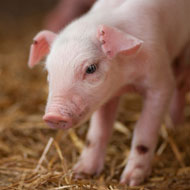Pig embryo study sheds light on human development

"...the pig can be an excellent model system for the study of early human development."
A novel pig embryo study has offered fresh insight into early human development, and could improve our understanding of genetic diseases.
How human germ cells, the precursors of sperm and eggs, form during early development has long puzzled scientists. Now, for the first time, research published in Nature shows the interplay between two genes is critical for the formation of these cells, which are key to the preservation of a species.
This ‘genetic cocktail’ changes in different species, with clear differences in the early development of humans and mice, but a much closer relationship between humans and pigs.
Dr Ramiro Alberio from the University of Nottingham said: “We’ve shown how precursors to egg and sperm germ cell arise in species with similar embryo development. This suggests that the pig can be an excellent model system for the study of early human development, as well as improving our understanding of the origins of genetic disease.”
Scientists say the knowledge gained from this approach can be applied to regenerative medicine, to derive human cell types that could help us understand how mutations that disrupt early human development lead to disease.
For Dr Alberio, this research is the culmination of a decade’s work on embryo development. He added: “We show how studying the pig embryo can help us design new methods for the differentiation of human sperm and eggs in a dish.
“The findings of our research will help scientists improve our understanding of the origins of genetic diseases such as germ cell tumours, foetal abnormalities and certain types of infertility.”



 RCVS Knowledge has welcomed Professor Peter Cockcroft as editor-in-chief for Veterinary Evidence.
RCVS Knowledge has welcomed Professor Peter Cockcroft as editor-in-chief for Veterinary Evidence.